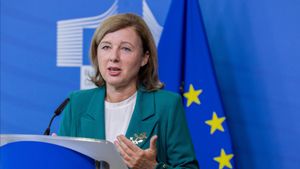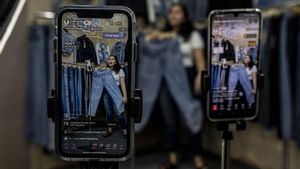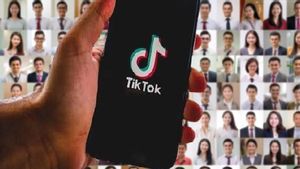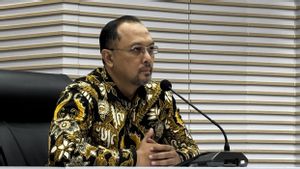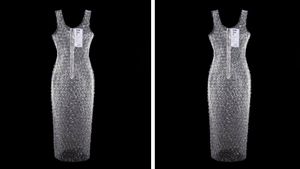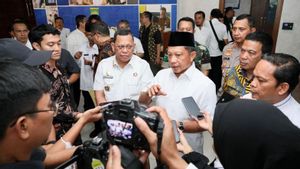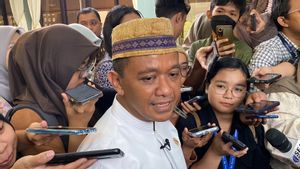JAKARTA - Commission VI of the Indonesian House of Representatives (DPR RI) highlighted the Government's policy which will revise the Minister of Trade Regulation (Permendag) Number 50 of 2020 concerning Business Licensing, Advertising, Development and Supervision of Business Actors in Electronic Trading (PPMSE). In the new regulations, social media platforms such as TikTok, Facebook, Instagram and Twitter will be prohibited from selling directly.
The revised Minister of Trade Regulation was issued following complaints from conventional traders who felt disadvantaged by the presence of social commerce such as TikTok Shop. The government will regulate that social commerce is only permitted to facilitate the promotion of goods or services.
According to Member of Commission VI of the DPR RI Andre Rosiade, the revised regulations must create fair regulations for conventional and digital business actors. Remember, 6 to 7 million Micro, Small and Medium Enterprises (MSMEs) use social commerce as a sales platform.
"One of the things that needs to be considered in the policy prohibiting transactions on social media is the need for justice between conventional business owners and business owners in the digital realm," said Andre, Wednesday (27/9/2023).
This legislator from the West Sumatra I electoral district reminded that in the era of information and communication technology which is increasingly seeping into everyday life, social media is not only a platform for people to interact. Andre highlighted how social media can also be a vital business tool or platform.
"Many MSME players rely on platforms such as Facebook, Instagram, Twitter and others to promote their products and services, as well as carry out transactions online. "We also have to think about what the best technical aspects are in the process of continuing buying and selling transactions between sellers and buyers if only promotions are allowed," he explained.
VOIR éGALEMENT:
Revision of Minister of Trade Regulation No. 50 of 2020 will refer to social commerce permits which are not buying and selling transaction platforms, so it will create a number of derivative regulations. The first rule of social commerce should only be to facilitate the promotion of goods or services. Both social commerce must have permission as e-Commerce.
Then the third rule limits imported products by separating negative and positive lists. Then fourthly, the behavior of imported and domestic goods must be the same. This means that food products must have a halal certificate, as well as skincare which requires a guarantee or permission from BPOM, and electronic products must have standards.
And the fifth rule is that social commerce must not act as a producer. Then the final rule is that import transactions can only be done once with a minimum of USD 100 or the equivalent of IDR 1.5 million.
These rules are important considering that in trading activities in social commerce such as TikTok Shop, imported goods can be purchased directly by Indonesian consumers, aka cross-border.
Digital business actors have also been protested for offering very cheap prices on social commerce. It is feared that this competition will kill domestic MSMEs.
Andre also hopes that the regulations derived from the revision of Minister of Trade Regulation No. 50 of 2020 can limit sales activities in social commerce which many conventional traders complain about.
“With the prohibition on sales and transactions, entrepreneurs will focus more on promotional activities. This can help them increase their visibility and brand awareness on social media," explained Andre.
“Apart from that, in some cases, entrepreneurs can avoid price competition that often occurs on social media. "They can also focus more on the added value of their products or services rather than just offering lower prices," he continued.
Even so, Andre sees that there are still several regulations that have the potential to be ineffective because they go against the flow of technological development. He said that social commerce provides a special shopping experience for consumers, and even gives rise to the phenomenon of impulsive buying which can benefit business actors.
"The advantages and disadvantages of prohibiting selling and transacting on social media really depend on the type of business, target market, and marketing strategy implemented by the entrepreneur. "So clear rules must be made immediately," said Andre.
Furthermore, Andre asked the Government to carry out massive outreach with the new regulations regarding social commerce so that there are no violations due to lack of education and literacy among business actors.
Members of the Commission in the DPR, one of whose duties is related to trade matters, also asked the Government to provide solutions for digital business actors with the new regulations. Moreover, said Andre, quite a few business people rely on social media to sell.
"The government could provide regulations requiring the collaboration of social commerce with e-commerce so that it would make it easier for digital business actors to sell their goods," he appealed.
Andre also asked the Government not to forget to provide education to conventional business actors so that they start using social media as a means of promoting their merchandise. That way, conventional business actors in markets or shops are not inferior to digital business actors.
"This will create justice for all business actors, both digital and conventional, because we all know that technological developments must be balanced with government support, both in terms of regulation and education so that business actors make the best use of technology," concluded Andre.
The English, Chinese, Japanese, Arabic, and French versions are automatically generated by the AI. So there may still be inaccuracies in translating, please always see Indonesian as our main language. (system supported by DigitalSiber.id)



